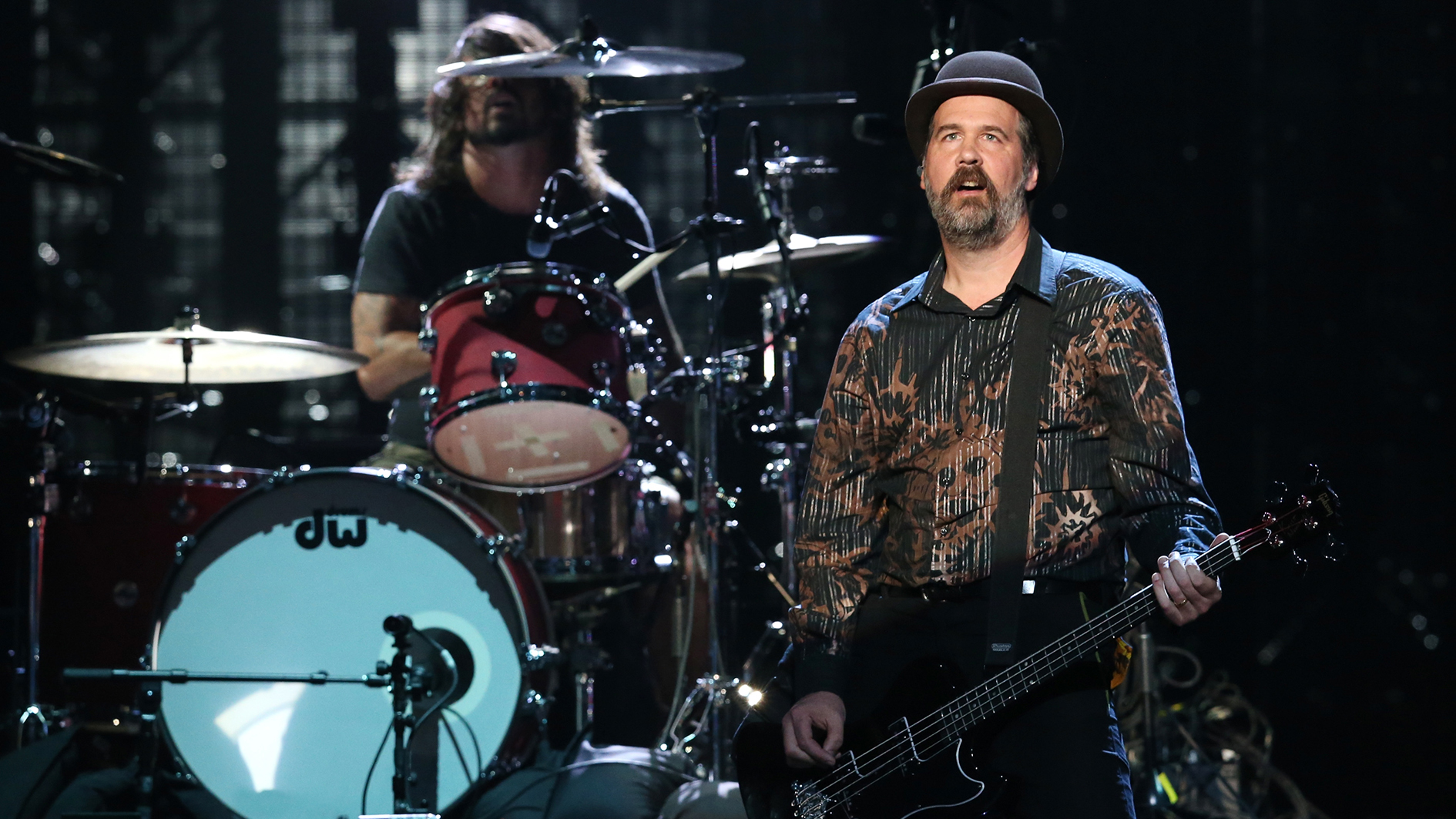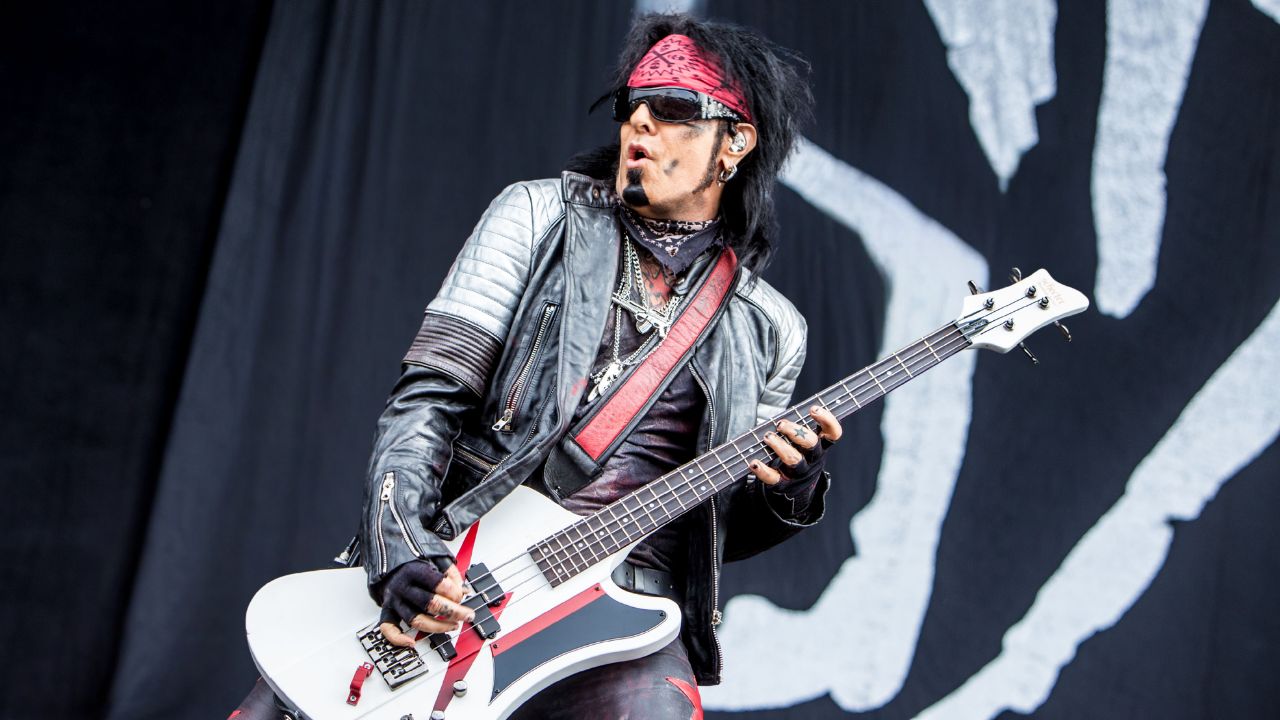Nirvana's Krist Novoselic: "I'm never in any bass magazines"
Back in 2012, we met the bassist turned political activist, commentator and now recipient of his own signature instrument

All the latest guitar news, interviews, lessons, reviews, deals and more, direct to your inbox!
You are now subscribed
Your newsletter sign-up was successful
“I’m never in any bass magazines!” chuckles Krist Novoselic, legend for an entire generation of grunge fans. Why should this be, we ask ourselves?
Perhaps it’s because his old band Nirvana have been defunct since 1994, when singer Kurt Cobain drew a permanent line under his career. Maybe it’s because Novoselic is best known these days not for his bass playing, but for his political writings and activism.
Either way, that may all be about to change. Gibson have recently unveiled Novoselic’s new RD bass, and unlike so many signature models, it seems that it didn’t take too many prototypes to complete.
As the man himself tells us, “It didn’t take long to do, because it’s just a reproduction of an RD with a new look. They built them in the 70s, and now you can buy a new one. What I did was, I shipped my standard RD to Gibson in Tennessee and said, ‘I really like this thing, but the pickups are kinda dull’ so they put a new Seymour Duncan Hot Stack on there. They made the headstock elongated and the fretboard is made of sustainable wood, too. I played it - and they nailed it first time.”
What we at the BP command bunker find it hard to believe is that no bass manufacturer has offered Novoselic a signature model before, even though his old band’s biggest albums - Nevermind and In Utero - had made him a household name by the mid 90s.
“No, I’ve never been asked!” he guffaws, perhaps unaware of how odd this is. “I was blown away when Gibson approached me, because I really loved that bass. Even if they’d just reissued it rather than made one for me, I would have bought one.
"You can’t even find these old basses on eBay: they go really fast on there, for like 2500 bucks. You can buy this new RD and keep it your whole life, it’s like a member of the family. You don’t have to bid on eBay for one, and it doesn’t have someone’s sweat all over it!”
All the latest guitar news, interviews, lessons, reviews, deals and more, direct to your inbox!
Nevermind's basslines are simple and melodic, which is what you need when you’re starting out on bass
Novoselic was also known back in the Nirvana days for playing a Gibson Ripper, a hefty instrument which normally needs at least three people just to pick it up off the floor.
“I’m six foot seven,” he explains, “which is lucky, because it’s a big bass. Check one out when you go to a music store. Try it on, because it’s big and heavy, it’s a big gun! But it’s got that sustain that I really like. You just let the note ring.
"That’s probably why I stuck with Gibson basses the whole way through, because they’re so dense. I played a blonde Ripper on Nevermind. I had two that got stolen, actually: the blonde one sounded different from my other black one. You just gotta try them out and see what works for you.”
Anyone familiar with Nirvana’s albums, or even solely with the epoch-shaping Nevermind - their biggest seller by some distance - will know that Novoselic made a point of laying down simple, catchy, effective bass parts with a tone to die for.
Those bass-lines have influenced a whole host of players, he tells us: “I’ve learned that countless people have learned to play bass from listening to those records, ha ha! They’re always coming up to me and saying ‘Those records taught me how to play’. They’re simple, melodic bass-lines, which is what you need when you’re starting out on bass.”
Does he listen back to his old recordings and cringe, or do those bass parts still sound good all these years later? “Oh, I’m happy with them, there’s no cringing there at all. We were a collaboration: Dave [Grohl, drums, now of the Foo Fighters] and Kurt had to like the bass parts too. So it’s all great. They came together really well.
"I still approach bass playing with the idea of ‘What does the song need?’ Like, if it’s a heavy, dark, grinding song, or a pop song that needs some melody, or whatever. I was really fortunate that I got to work with Kurt: he was such a talented songwriter and he had a real ear for a hook, so as far as I was concerned playing bass with him was super-easy.
I still play bass, I was doing it last week, but it’s just a helping hand these days
"My unsolicited advice for bass players is that you’re not chained to the guitar: you’re chained to the kick drum, right? But listen to what the vocal melodies are doing. If you can accentuate that and play off that, you’re adding a dynamic to the band and to the song, and if you’re lucky and it comes together, it sounds big.”
Big was indeed what Novoselic’s bass sounded like, and in many ways he occupied a dream situation for any bassist - a power trio with plenty of space not just for his parts to move around, but also to lend melody to the chords and riffs.
“I had lots of room for the bass,” he affirms, “and Nirvana had these hard, soft, loud, quiet dynamics which required lots of octave parts and parts that were higher on the neck. I’d go down to that E string when the big chorus came, boom!”
This reminds us of ‘On A Plain’, the Nevermind song on which the other band-members mute after each chorus for Novoselic to play a three-second descending riff. “Oh yeah!” he recalls. “In ‘On A Plain’ the E string is drop-tuned to D, so I rotated between the D string and the drop D. There you go. It was a real simple riff that the vocals were wrapped around, so I wanted to do something to bounce it up a little bit.”
Is Novoselic the same bass player today as he was in the heady days of 1991? “I think so,” he muses. “I’ve been doing the same things lately as I used to do. I’ll tune in to whatever the riff is, and play with dynamics and do different things. I played on the Foo Fighters’ new album: I went in and I played lead bass, because Nate Mendel is the bass player in the Foo Fighters, so he played the [lower] bass on that song.
I never did any funk playing myself: I come out of the school of John Entwistle and Geezer Butler, and of course Paul McCartney. Those are the big three for me.
When I showed up they said: ‘Oh Krist, you’re going to play lead bass!’ I’m like ‘OK’ and they had this Gibson Ripper there. I plugged in a Rat distortion pedal and said, ‘Great, roll the Pro-Tools!’ They said ‘No!’ I said, ‘What do you mean, no?’ and they said ‘We’re making this on tape, dude, remember we told you?’
"And I was like ‘You mean I gotta do the whole take?’ and they were standing there with their arms crossed, saying ‘Yep! Can you do it? Can you still do it, Krist?’ It was a real separate-the-men-from-the-boys situation, so I said ‘Yeah, I’ll do it!’ Ha ha!”
Anathema this might be to Nirvana’s resolutely anti-establishment stance, but did Novoselic ever venture into slap-and-pop playing? “I never did,” he says, as we expect. “It was Flea from the Chili Peppers who brought that back.
"I never did any funk playing myself: I come out of the school of John Entwistle and Geezer Butler, and of course Paul McCartney. Those are the big three for me, along with Mike Mills from R.E.M. I played just rock bass, without any kind of funk in it.
"I remember in the early 80s when the Chili Peppers were raging: you’d have these dudes with a five-string and a Gallien-Kruger amp. I would play through an Ampeg with a 2x15” cab: old-school.”
Asked how Novoselic got into bass in the first place, he embarks on a nostalgic train of thought which will leave students of alternative music speechless. “When I was living in Aberdeen, Washington and playing with Kurt,” he begins, “he had this Mosrite Univox guitar and a nice Peavey tube amp, so I got a Fender Mustang guitar and used it as a bass.
We were playing in a trio so I had a lot of latitude, but I tried to keep it nailed down: I let the drummer and the guitar player go off while I kept it tethered to the ground
"We knew this person who had this cheap 60s Japanese bass and a cheap amp called a PMF. He was kind enough to let me borrow it, and then we found this drummer Aaron Burckhard, and we were among a group of youngsters who would hang out with the Melvins drummer Dale Crover.
"They rehearsed at his parents’ house, and we’d hang out on the back porch and listen to them rehearse. They were very disciplined and would play every day for hours. We wouldn’t bother them: we would just sit and listen.”
He continues, “The Melvins were so focused, so Kurt and Aaron and I took that ethic and started playing like that. We said, ‘We’re gonna be like the Melvins, we’re gonna be tight and play a lot’, and Kurt was such a prolific artist that he’d be off drawing something, or doing some kind of sculpture, or some kind of weird collage, and he’d write songs.
"He was always compelled to express himself, and that’s how the band started. I just fit in as a bass player: Kurt was really inspired by Greg Ginn and Black Flag. He wasn’t like a technical riff guitarist: he just made this kind of abstract sound.
"I just fell into playing bass: I had this black Ibanez for 300 dollars, which was a good bass. We were working and I bought a bass amp, so I had my own setup, and I just fell into this Ibanez. We were playing in a trio so I had a lot of latitude, but I tried to keep it nailed down: I let the drummer and the guitar player go off while I kept it tethered to the ground.”
Many a grunge fan would kill to have been at Nirvana’s rehearsals in those far-off days. Did Novoselic ever throw in a few complex fills to push the songs along? “I guess, yeah. A lot of it was just scales, though. It depended on what was going on in the band. We would have these rehearsals and just make up songs.
"I don’t know why we didn’t have a tape recorder there, or a multi-track or something. The songs that were after Nevermind and before In Utero… we would pull those songs out so fast, and Kurt would make up a vocal, and so many of those things were lost. We were just making stuff up because we really liked playing together.”

Nowadays Novoselic is studying for a law degree. “Yes, that’s my goal,” he nods. “I go to school. In fact, I’m going to be on TV on a political commentary show this afternoon. I still play bass, I was doing it last week, but it’s just a helping hand these days. I have my bass set up in the living room over there, I still have that same HiWatt head that I used in In Utero. That’s hooked up to a new 8x10”. It shakes the whole house.”
It would be remiss of us if we didn’t ask Novoselic if he has ambitions towards public office. “No, I’m never going to do that, I don’t need a job!” he states emphatically. “I’m into transformational politics.
"In the United States things are really out of whack: people are protesting all around the country. I was skeptical at first, but these Occupy movements have really captured the imagination of the establishment as a movement, so the next thing those people should do is run for office. That’s what you do in a stable democracy, right?”
But you can’t take Novoselic out of politics, just as you couldn’t take the politics out of Nirvana, in the final analysis. “I have so many blessings,” he says. “I got to play with Dave Grohl and Kurt Cobain. I don’t want to run for office, you have to go to all these meetings. Forget it! People gotta get together. Twitter, Facebook… the social networking thing.
"Can you imagine if you won the election with 99 percent of the population? That would be a commanding lead….” Let’s hope he changes his mind about running for office. President Novoselic? Sounds good to us.
Krist chooses his favorite Nirvana bass-lines
“Wow, which would I pick? I like ‘Lithium’, I like ‘Heart Shaped Box’, I like some of the work I did on that. ‘Lounge Act’ is good. ‘Smells Like Teen Spirit’. ‘In Bloom’… that was my Mike Mills bass part. Those little fills I do there were swiped off R.E.M. records. I like the bass I do on ‘Something In The Way’, the way I march up and down that scale. It’s only four or five notes, but the whole point of ‘Something In The Way’ is not to get in the way.”
At the 1992 MTV Music Video Awards, Novoselic threw his bass in the air, forgetting that it would be coming down again shortly afterwards. It landed on his head.
“Oh that was mega! Yeah! What happened was, there was all this weirdness going on, like bad energy. We started playing this song and my amp just didn’t work. It basically took a crap on me.
"So I thought ‘I’m gonna do this bass toss and walk off’. Well, the bass got caught in the TV lights, and then boom! It fell on my head. I was like ‘Oh man, I’m so embarrassed, what am I gonna do?’ It was in front of 200 million people, right? So I storm off stage, like ‘I’m outta here!’ and I find this bathroom and I see there’s blood on my hands.
"So I wash my head and I wash my hands, and these paramedics come and take a look at me and they say ‘Oh, you’re fine’ and put a bandage on and say ‘Sign here’ and I had to sign all these release forms so I’m not gonna sue anybody. So I’m all annoyed, right, and I’m like ‘What the hell!’ and behind them there is this amazing fellow, with a glass of champagne.
"It’s Brian May! Ha ha! Just standing there politely. He says ‘Here you are, my good man’ and he hands me this glass of champagne. I’m like ‘Thank you so much’! It was amazing, I felt so much better. I was like ‘You’re Brian May! How are you?’ and he was said, ‘More importantly, how are you?’”
Bass Player is the world’s most comprehensive, trusted and insightful bass publication for passionate bassists and active musicians of all ages. Whatever your ability, BP has the interviews, reviews and lessons that will make you a better bass player. We go behind the scenes with bass manufacturers, ask a stellar crew of bass players for their advice, and bring you insights into pretty much every style of bass playing that exists, from reggae to jazz to metal and beyond. The gear we review ranges from the affordable to the upmarket and we maximise the opportunity to evolve our playing with the best teachers on the planet.

